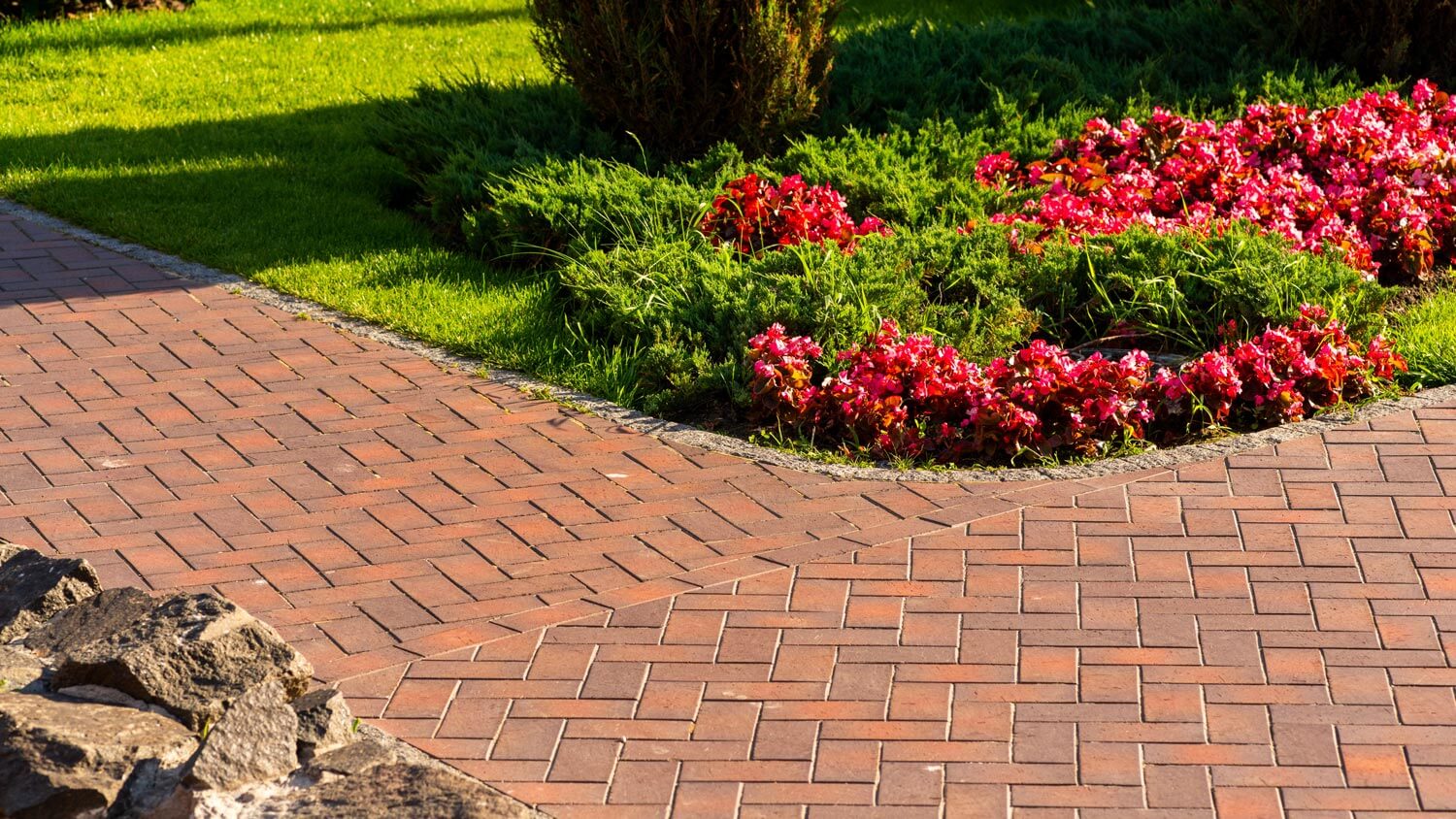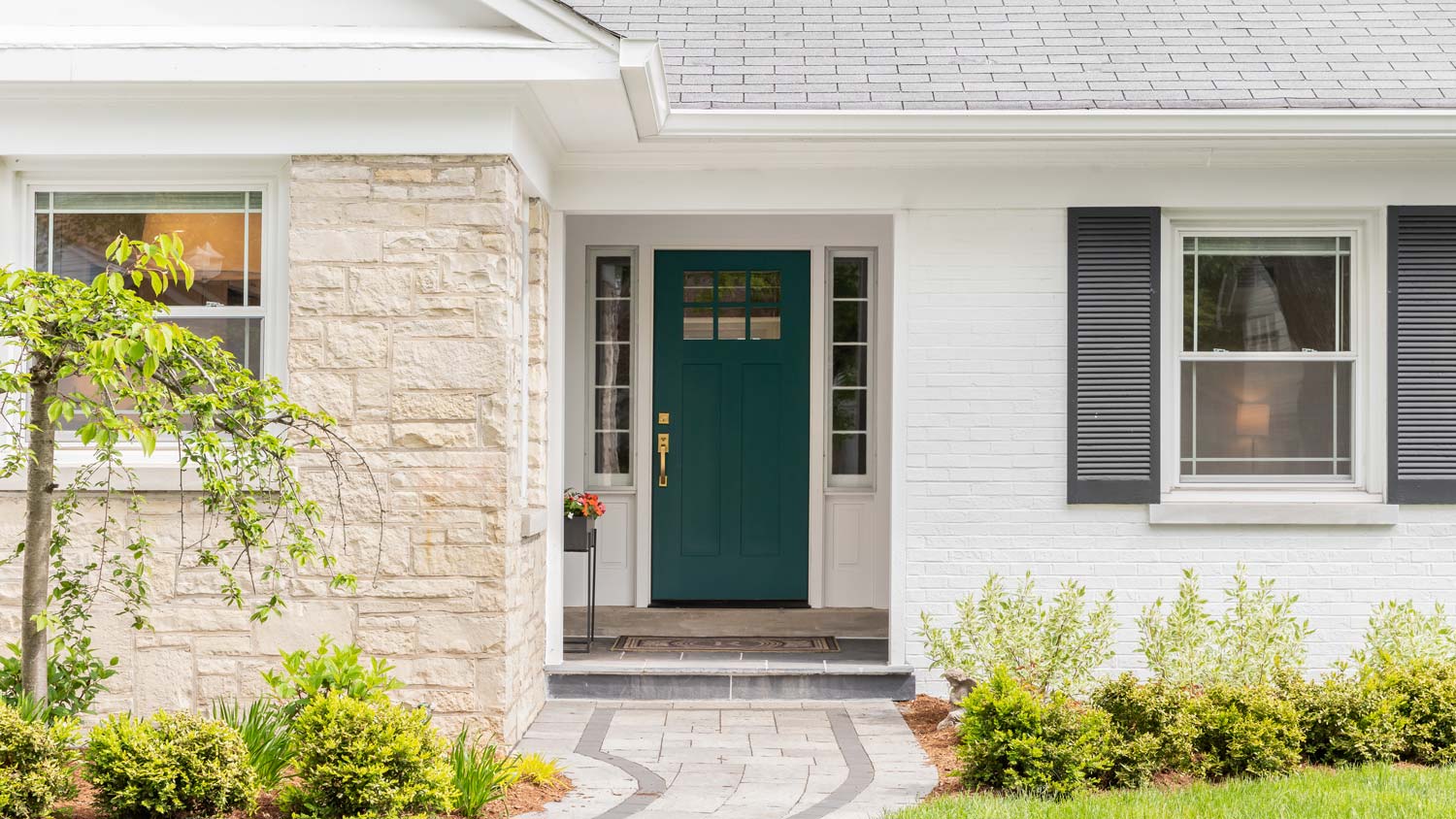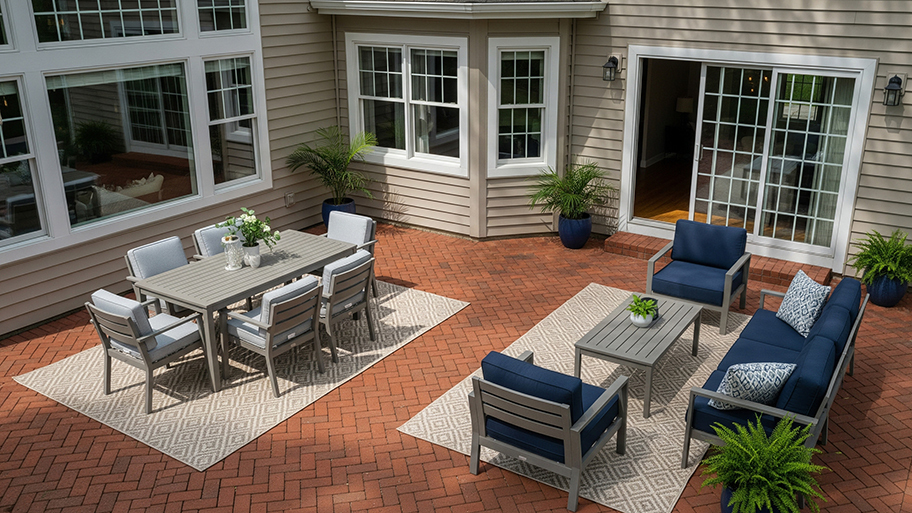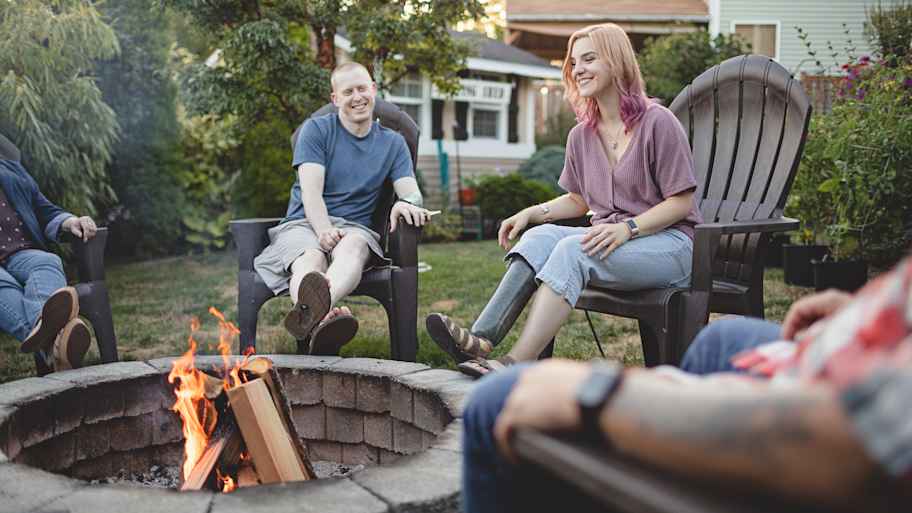
Discover the average stone restoration cost, including price ranges and key factors, to help you plan your next home project with confidence.
Brick walkway cost averages $4,500, with most homeowners spending between $2,500 and $8,000. Prices depend on walkway size, brick type, labor, and design complexity.


The average cost to install a brick walkway is $4,500, with most homeowners paying between $2,500 and $8,000, and national costs ranging from $450 to $14,000.
Labor for professional installation ranges from $50 to $100 per hour or $6 to $12 per square foot, depending on complexity, accessibility, and location.
Walkway size and design impact costs: small garden paths $450 to $1,200, standard 100-square-foot entryways $2,500 to $8,000, and large custom walkways $6,000 to $14,000.
Custom patterns, borders, accent bricks, lighting, or drainage features can add $50 to $500 or more to the total project cost.
Permits, grading, site prep, delivery, and inspections, $50 to $200, can significantly affect the final price.
This article was created using automation technology and thoroughly fact-checked and edited by an Angi Editor in accordance with our AI policy.
Brick walkway costs range from $450 to $14,000, with an average of $4,500 for a standard 100-square-foot path. Homeowners can expect to pay between $15 and $30 per square foot, depending on the type of brick, labor rates, and the complexity of the design. Understanding these factors helps you budget for a lasting, attractive walkway.
A brick walkway adds beauty and function to your yard, but prices depend on materials, project complexity, and local labor costs. Let’s look at what goes into the cost of a brick walkway so you can plan with confidence.
The dimensions of your walkway are the biggest factor in determining the overall cost of your project. The length, width, and total square footage directly impact the amount of materials and labor needed. For most residential walkways, widths range from three to four feet, and lengths can vary from 20 to 60 feet. Small garden paths often use fewer materials and cost less, while large entryways or walkways with curves, steps, or branches require more bricks, prep, and labor.
Curves, steps, and unique layouts increase both material usage and installation time. A straight, standard path is more affordable than a winding or multi-branch design. The table below breaks down how brick walkway costs change based on overall size and scope:
| Walkway Size (Sq. Ft.) | Description | Average Cost | Cost Range |
|---|---|---|---|
| 30 | Small garden path | $750 | $450–$1,200 |
| 100 | Standard entry walkway | $4,500 | $2,500–$8,000 |
| 200 | Large custom walkway | $9,000 | $6,000–$14,000 |
Where you live has a significant impact on the cost of a brick walkway. Material and labor prices vary widely across the country. Urban areas often have higher labor rates, while rural locations may see increased delivery charges for bricks. Climate also matters: regions with freeze-thaw cycles may require extra site preparation or drainage, raising costs.
Expect to pay more in cities with high demand for skilled masons or where building codes require additional steps.
The cost of a brick walkway depends on several key factors, including labor, permits, design choices, and site conditions. Let’s look at what drives the price up or down.
Installing a brick walkway requires skilled professionals, such as masons, landscapers, or general contractors. Labor rates are commonly charged per square foot or hour, with national averages ranging from $6 to $12 per square foot or $50 to $100 per hour.
Smaller jobs may face minimum service fees, making short paths less cost-effective per foot. Complex brick designs—such as curves, steps, or intricate patterns—can require more time and skill, thereby increasing labor costs. Hiring a pro ensures your walkway is durable, safe, and visually appealing.
Some municipalities require permits for installing brick walkways, especially if the project alters drainage, affects public sidewalks, or involves significant grading. Permit fees vary by location, ranging from $50 to $200. Inspections may also be required to ensure compliance with local codes, which can add to the total cost. Always check with your city or county before starting work to avoid delays or fines.
The cost of your walkway will rise if you opt for custom features. Patterns like herringbone, basketweave, or running bond each have different installation requirements and material waste.
Adding borders, accent bricks, or decorative inlays increases both material and labor costs. Incorporating lighting, drainage systems, or accessibility features (such as ramps or wider paths) adds to the project scope. Decorative elements, such as engraved bricks or mosaics, can further increase the final cost.
Several site-specific factors can influence brick walkway cost:
Grading and slope: Steep or uneven terrain requires more prep and materials.
Accessibility: Hard-to-reach sites may raise labor or delivery fees.
Site preparation: Removing old walkways, debris, or vegetation adds to the workload.
Delivery charges: Transporting bricks and supplies can be costly, especially in remote areas.
Post-construction cleanup costs: Removing debris and restoring landscaping may incur extra charges.
Design fees: Custom layouts or hiring a landscape architect will increase costs.
Required inspections: Some areas require multiple inspections, each with a fee.
Beyond the initial installation, several ongoing or one-time costs can affect your total brick walkway cost.
Brick walkways require periodic maintenance to stay in top condition. Tasks include cleaning, sealing, removing weeds, and replacing joint sand. Annual maintenance costs range from $100 to $300, depending on length and features. Keeping up with maintenance extends the lifespan of the walkway and prevents costly repairs.
Expect to pay sales tax on both materials and labor in most states. Some municipalities may also levy local taxes or improvement assessments for outdoor projects. It’s important to factor these into your total budget.
Hiring a local brick walkway installation pro costs more upfront, but you benefit from precise planning, proper base preparation, and expert installation. Pros bring the right tools—such as plate compactors, masonry saws, and leveling equipment—and the experience needed to create a durable, even walkway that complements your landscaping.
Installing a brick walkway involves site grading, base layering, cutting bricks, and ensuring proper drainage. Here are some of the top reasons to work with a pro:
Pros know how to prepare the ground and lay a stable base of gravel and sand to prevent shifting, settling, or cracking.
They cut and fit bricks precisely, creating clean edges and consistent patterns without wasted materials.
Hiring a pro reduces the risk of uneven surfaces, trip hazards, or improper slopes that could cause water pooling or drainage issues.
Many contractors can bundle services such as edging installation, sealing, or custom patterns, helping streamline the entire project.
If you want to take on some tasks yourself, here are a few DIY steps that can help reduce time and labor costs:
Clear the walkway area of debris, plants, and obstacles to provide a clean workspace.
Measure and mark the desired path to help the professional plan the layout accurately.
If allowed locally, you can dig out small sections or remove existing surfaces ahead of time, reducing the labor required during full installation.
Over time, your walkway may need repairs or even full replacement. Knowing the difference helps you make informed decisions.
Repairs are sufficient for minor issues such as loose bricks, small cracks, or slight settling. If damage is widespread—such as major heaving, poor drainage, or significant brick deterioration—full replacement is the better option. Consider the age of your walkway and whether it’s still under warranty when making your decision.
Repair costs vary based on the problem. Resetting bricks or repairing joints may cost between $200 and $1,000, depending on the extent and accessibility of the work. Full replacement, on the other hand, costs between $2,500 and $8,000 or more. If repair costs reach 50% of the replacement cost, it’s often more cost-effective to start fresh. New walkways offer improved durability and can resolve underlying issues for the long term.
Adding a brick walkway is more than a cosmetic upgrade—it’s a smart investment in your property.
A well-designed brick walkway can deliver a return on investment of 30% to 60%, especially when it boosts curb appeal and complements your home’s style. Brick stands out compared to concrete or gravel walkways, thanks to its classic look and long lifespan.
Additional benefits include improved safety, accessibility, and universal design, making your home more appealing to a wider range of buyers. Aesthetically, brick walkways are timeless and can set your property apart in the neighborhood.
Here are a few helpful ways you can reduce the cost of your brick walkway project:
Choose standard brick sizes and simple patterns to lower material and labor costs.
Source bricks locally to reduce delivery fees.
Schedule installation during off-peak seasons for potential discounts.
Prepare the site yourself (e.g., remove the old walkway and clear debris).
Get multiple quotes from licensed pros to compare pricing and services.
Opt for straight paths over curves or complex layouts to minimize waste.
Maintain your walkway regularly to avoid costly repairs.
Let your pro know the size, shape, and pattern of the brick walkway you want to install, so they can plan for the right materials, tools, and timeline.
Describe any underlying issues you’ve noticed, like uneven ground, poor drainage, or existing cracks, that could affect installation or require additional preparation.
Ask whether you need to prep the area beforehand, such as clearing vegetation, removing old walkways, or marking the desired layout.
Confirm whether unexpected costs could arise from issues like difficult access, slope adjustments, or the need for additional base material.
If you’re considering follow-up work—like adding edging, lighting, or sealing the walkway—ask whether it’s more efficient to bundle those services with the brick walkway installation.
Home is the most important place on earth, which is why Angi has helped more than 150 million homeowners transform their houses into homes they adore. To help homeowners with their next project, Angi provides readers with the most accurate cost data and upholds strict editorial standards. We extensively research project costs to develop the pricing data you see, so you can make the best decisions for you and your home. We rely on reputable sources, including the U.S. Bureau of Labor Statistics, academic journals, market studies, and interviews with industry experts—all to ensure our prices reflect real-world projects.
Want to help us improve our cost data? Send us a recent project quote to [email protected]. Quotes and personal information will not be shared publicly.
Kurtis from Bend Home Management Solutions was GREAT to work with! He was professional, punctual, responsive to questions, and did excellent quality work. I recommend him without reservation and hope to have the opportunity to work with him again in the future.
Larrabie was fantastic. Quick bid and added me to their busy schedule right away. They showed up on-time and were extremely professional. Their work was exceptional and even came in under the estimate. I would hire Larrabie again without hesitation and will continue to recommend their...
Zehnder Glass did a great job. Their prices were good. The work was well done. They were able to get the job done in a timely manner. Would definitely recommend.
Impressed with Jeff's attention to detail and responsiveness. He explained the work process and time it would take to complete job. Kept us informed when there were delays. All work done to our satisfaction. Would highly recommend him.
Ben was very professional and courteous. He was very fast to respond to my request for quote and was also able to get the job started and completed quickly and on time. I would highly recommend Ben and Rockman Masonry & Concrete, I will certainly be using him for future projects.
I had accell install new laminate floors in my kitchen
I would grade them an A on everything. There was just one person who came out to do the inspection and he was there for probably an hour or so.
Planning was responsive, informative, creative. Worked through several concepts, landed, and priced. Turn-key service and project pricing, with well specified contract. Installed crown moldings, bead-board panel, chair-rails and painted all. Flawless finish work by carpenters and painter....
Called the phone number listed on website and spoke with the owner. She provided us with the email address so that we could send her our specs and a drawing of the job. Specs included masonry work and plant installation. Owner emailed with a glowing reply about the detailed specs and said she...
Mr. Sutter did prune our trees and clear out the front bedding areas. He and his crew also removed the grass and weeds from the raised garden beds, but did nothing to prevent the flora from returning. He recommended placing paver rocks in sand for the walkways as this was the method used for...
From average costs to expert advice, get all the answers you need to get your job done.

Discover the average stone restoration cost, including price ranges and key factors, to help you plan your next home project with confidence.

Need to repoint brick in your home to make your home look fresh and new? Use this guide to repointing brick cost to price out your project before starting.

Door or window lintel replacement costs $400 on average, but there are ways you can save. On the other hand, complicated work will increase costs considerably.

Installing shutters on brick is a quick way to boost your curb appeal. From hardware to drilling tips, this guide covers every step of shutter installation.

Here are the steps to repair your brick patio—whether you need to re-level a sinking patio or replace missing mortar.

A fire pit adds attractive entertainment space to your backyard. Learn about standard fire pit dimensions and what factors contribute to fire pit size.